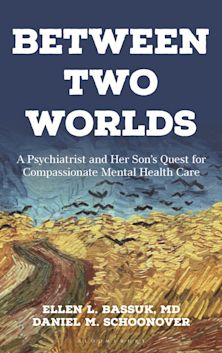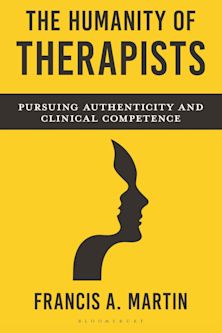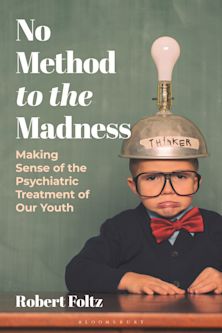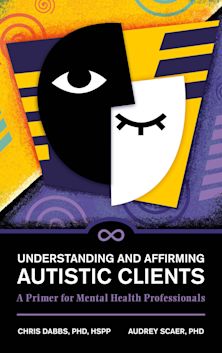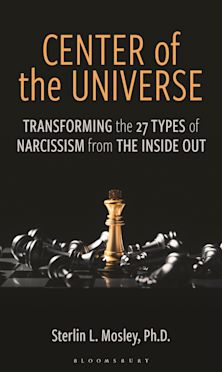- Home
- ACADEMIC
- Psychology
- Psychopathology & Clinical Psychology
- Becoming a Clinical Psychologist
Becoming a Clinical Psychologist
Personal Stories of Doctoral Training
Danielle Knafo (Anthology Editor) , Robert Keisner (Anthology Editor) , Silvia Fiammenghi (Anthology Editor) , Adi Avivi (Contributor) , Brianna Blake (Contributor) , Silvia Fiammenghi (Contributor) , Benjamin Gottesman (Contributor) , Noel Hunter (Contributor) , Dustin Kahoud (Contributor) , Kathleen Kallstrom-Schreckengost (Contributor) , Robert Keisner (Contributor) , Danielle Knafo (Contributor) , Samantha Shoshana Lawrence (Contributor) , Matthew Liebmann (Contributor) , Jeremy Novich (Contributor) , Adjoa Osei (Contributor) , Ian Rugg (Contributor)
Becoming a Clinical Psychologist
Personal Stories of Doctoral Training
Danielle Knafo (Anthology Editor) , Robert Keisner (Anthology Editor) , Silvia Fiammenghi (Anthology Editor) , Adi Avivi (Contributor) , Brianna Blake (Contributor) , Silvia Fiammenghi (Contributor) , Benjamin Gottesman (Contributor) , Noel Hunter (Contributor) , Dustin Kahoud (Contributor) , Kathleen Kallstrom-Schreckengost (Contributor) , Robert Keisner (Contributor) , Danielle Knafo (Contributor) , Samantha Shoshana Lawrence (Contributor) , Matthew Liebmann (Contributor) , Jeremy Novich (Contributor) , Adjoa Osei (Contributor) , Ian Rugg (Contributor)
This product is usually dispatched within 1 week
- Delivery and returns info
-
Free US delivery on orders $35 or over
You must sign in to add this item to your wishlist. Please sign in or create an account
Description
Whether you are thinking about starting therapy, going to graduate school, or are yourself a practicing healer of hearts and minds, Becoming a Clinical Psychologist: Personal Stories of Doctoral Training offers a wealth of useful information about today’s training and trainees.. This book is a collection of accounts written by a diverse group of early-career psychologists and doctoral students in their final stages of training. Each of the twelve authors provides a deeply personal, inside perspective on becoming a therapist. Some of the chapters combine qualitative research with the author’s particular experience, while others emphasize the author’s personal journey as s/he moves from novice to clinician. Some of the issues that are covered include the ways in which training affects personal and professional relationships with spouses, friends, peers, faculty and supervisors, and clients; how budding clinicians deal with their own issues and feelings of inadequacy; and how trainees learn to develop the right balance of empathy and detachment in working with clients. Also unique to this collection is the diversity reflected in the contributors, which include an Orthodox Jewish gay man who “came out” during training; a Black woman of African descent who found a home in the psychoanalytic approach; a White man who experienced minority status in his mostly female doctoral program; a bisexual, White woman who had to negotiate misperceptions and judgments as she moved through her clinical training; and a dissident student who came from another profession and found herself at odds with most of her professors and supervisors about the role of trauma in the etiology of mental illness. Becoming a Clinical Psychologist is a compelling read for those both inside and outside the field of psychology.
Table of Contents
Part I: Beginner’s Mind: First Experiences Conducting Therapy
Chapter 1: Personal and Professional Integration in a Dual-Oriented Doctoral Program
Dustin Kahoud
Chapter 2: Conducting Therapy for the First Time
Adi Avivi
Chapter 3: Guilt in the Beginning Therapist: Etiology and Impact on Treatment
Benjamin Gottesman
Chapter 4: The Novice in the Therapist’s Chair
Samantha Shoshana Lawrence
Part II: Navigating the Personal and Professional during Doctoral Training
Chapter 5: Clinical Psychology Training and Romance: For Better or for Worse?
Silvia Fiammenghi
Chapter 6: Clinical Psychology Doctoral Students with a History of Eating Disorders
Brianna Blake
Chapter 7: Life as a Juggler: Work, Family, and Study inside a Doctoral Psychology Program
Matthew Liebman
Chapter 8: Experiences of a “Black Sheep” in a Clinical Psychology Doctoral Program
Noel Hunter
Part Three: Outside the Norm: Effects of Diversity in Training and Treatment
Chapter 9: A Few Good Men: The Male Experience of Minority Status in a Clinical Psychology Doctoral Program
Ian Rugg
Chapter 10: Notes from a Queer Student’s Graduate Training
Kathleen Kallstrom-Schreckengost
Chapter 11: Finding My Place in Psychoanalysis as a Black, Female Student
Adjoa Osei
Chapter 12: From the Closet to the Clinic: An Orthodox Jewish Man Comes Out in Training
Jeremy Novich
Contributor Notes
Product details
| Published | Feb 06 2015 |
|---|---|
| Format | Hardback |
| Edition | 1st |
| Extent | 220 |
| ISBN | 9781442239920 |
| Imprint | Rowman & Littlefield |
| Dimensions | 9 x 6 inches |
| Publisher | Bloomsbury Publishing |
About the contributors
Reviews
-
The book Becoming a Clinical Psychologist: Personal Stories of Doctoral Training...captures the concerns of graduate students in doctoral clinical psychology programs, and it outlines them in honest, touching, thoughtful, and insightful narratives. The book contains a total of 12 chapters which are organized into three sections pertaining to the experiences of beginning therapists, the personal and professional challenges involved in training, and the training and clinical practice of doctoral students belonging to diverse groups. This book reminds students, professors, and supervisors of the fears that graduate students tend to have in their training such as fears of evaluation, of failure, of incompetence, and of the need for self-care during the training process. The beginning clinical psychology trainee can experience a good deal of stress and isolation, and this book can serve as an extremely useful source of social support. It offers narratives of both common experiences and unique circumstances with which the student in a clinical psychology program can identify. . . .This book can function as a foundation for the doctoral clinical psychology student seeking validation for thoughts and feelings related to their diverse experiences. In addition, professors and supervisors can use this book to better understand their students as individuals, to gain perspective on their fears and concerns, and to avoid asking inappropriate questions of the graduate student based on a lack of understanding of diverse issues. . . .[T]his book may encourage faculty and supervisors to become more sensitive to the questions they ask graduate students.
PsycCRITIQUES
-
This volume provides an important adjunct to clinical training in psychology. It will be a valuable resource for both students and educators, inviting in-depth consideration of the personal challenges entailed in becoming a clinical psychologist.
Marilyn Charles, PhD, Austen Riggs Center
-
This unique book provides a collection of candid, revealing, and deeply personal accounts of the trials, tribulations, rewards, and joys experienced by students undergoing training to become clinical psychologists and psychotherapists. What is it like to be seeing your first patient in therapy? What are the unexpected ways in which undergoing training affects relationships with friends, families, and romantic partners? What is it like to be struggling with your own personal problems, while training to help others? What is it like to be the only black trainee in your training program? What is it like to be pathologized for being a man when most of your fellow trainees are women? What is it like for a gay orthodox Jewish trainee to be struggling with ‘coming out of the closet?’ This book is a must-read for anyone teaching therapists, those undergoing clinical training, and those thinking of becoming a therapist, undergoing therapy, or just plain curious about psychotherapy.
Jeremy D. Safran, PhD, New School for Social Research
-
The field of clinical psychology is evolving in the direction of becoming more research-oriented. The fact remains, though, that most clinical psychologists will never become clinical researchers, and the need for quality clinical training will not soon disappear. Indeed, now more than ever, there is a need to articulate and strengthen our understanding of the process through which trainees transform into professional, competent practitioners. Therefore, Knafo, Keisner, and Fiammenghi’s Becoming a Clinical Psychologist: Personal Stories of Doctoral Training, is a welcomed and timely contribution, which has the distinct merit of allowing us to hear doctoral students describing their own experience. The introduction provides a lively overview of the contemporary scene in clinical psychology, and many of the chapters outline personal aspects of experience as well as focusing on issues around diversity. Anyone who is contemplating entering the field, anyone who has recently joined the field, and anyone who has the responsibility of training students will find this book informative and helpful.
Elliot Jurist, The City College of New York













